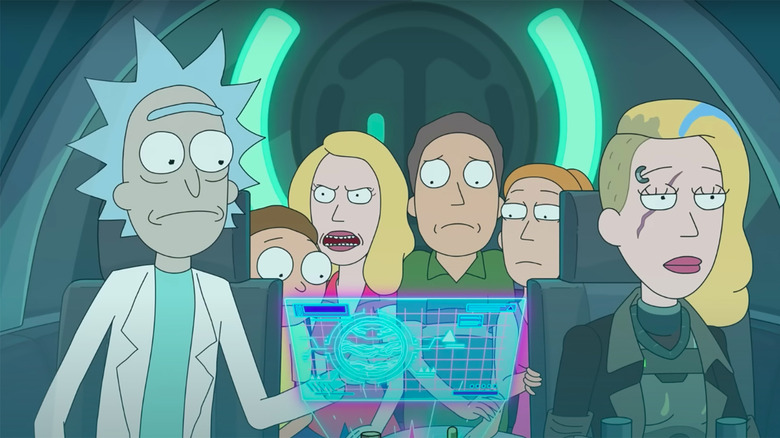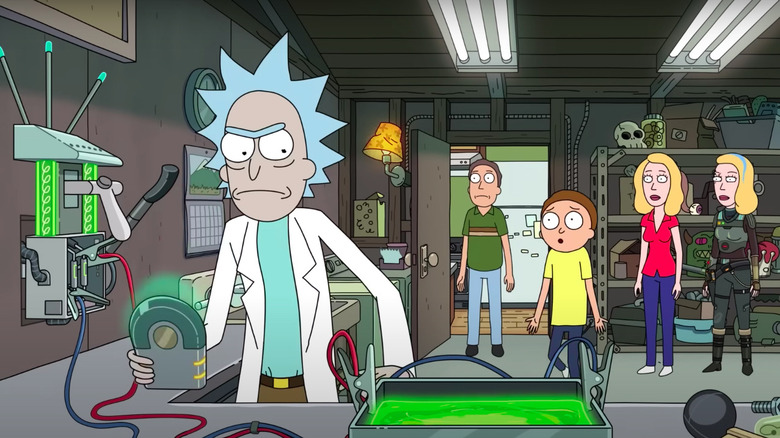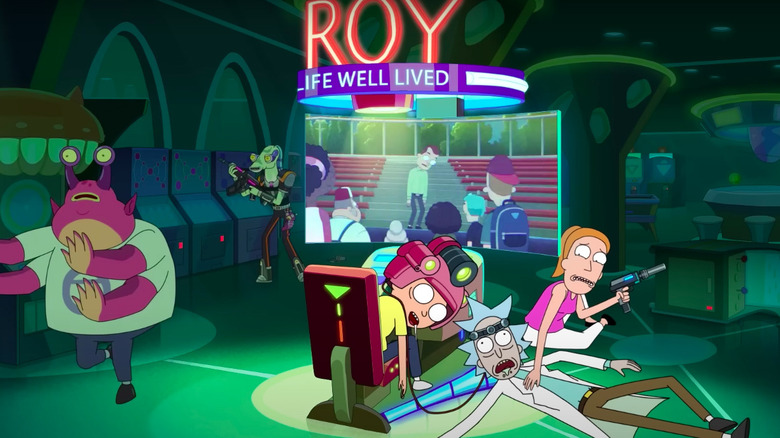Rick And Morty Season 6 Review: The Hysterical Sci-Fi Havoc Continues In Serial And Procedural Fashion
The fifth season finale of "Rick and Morty" concluded with a game-changing scenario. The episode entitled "Rickmurai Jack" saw the return of Evil Morty and the Citadel of Ricks, both of which were introduced all the way back in the first season in "Close Rick-counters of the Rick Kind." Evil Morty took over the Citadel of Ricks in the season 3 episode "The Ricklantis Mixup," and in the fifth season finale, Evil Morty revealed that the multiverse, as we've experienced it in "Rick and Morty" thus far, isn't quite as expansive as we think.
Instead, the various universes that Rick and Morty (both voiced by series co-creator Justin Roiland) have visited throughout the first five seasons were only those that exist within a barrier referred to as the "Central Infinite Curve," or as Evil Morty described it, "One infinite crib around an infinite f**king baby." It was Rick's way of controlling his own world after losing his wife Diane and daughter Beth at the hands of another portal-traveling Rick from the future, who he vowed to chase across the multiverse with the hopes of killing him. Like almost everything Rick has done, it was created in an effort to keep himself distracted from confronting the pain that he's never properly dealt with. Evil Morty had enough, and he used the Citadel of Ricks, as well as all the Ricks and Mortys within it, to power an escape into the larger multiverse where there are no barriers created by Rick. What's more is that Evil Morty has rendered Rick's portal gun useless, leaving Rick and Morty to die on the crumbling Citadel.
All this is to remind you of what has happened before we kick off "Rick and Morty" season 6, which gives us the most direct continuation of a serial storyline since the third season premiere picked up in the aftermath of the second season finale.
Solaricks
However, just because the sixth season premiere digs deep into canonical storytelling that has slowly expanded across dozens of episodes doesn't mean this season will abandon the adventure-of-the-week formula that also makes the series so much fun. I've seen the first two episodes of "Rick and Morty" season 6, and without getting into any spoilery specifics, these episodes offer the best of both worlds: a growing serial storyline and a one-off adventure, each taking full advantage of the multiverse potential that makes this sci-fi world raucously hilarious, delightfully chaotic, and endlessly entertaining all at once.
With the Marvel Cinematic Universe digging into the multiverse, it only seems appropriate that the "Rick and Morty" season 6 premiere takes a cue from "Avengers: Endgame." Having been left for dead, Rick gets his own near-death Tony Stark moment from the Marvel sequel's opening, complete with a nonchalant and self-deprecating reference to the scene in question. Since we've been instructed to avoid revealing certain plot details, we'll just say that's not all that this episode, titled "Solaricks," borrows from the end of Marvel's Infinity Saga. The entire plot of this episode will undoubtedly be familiar to fans of Marvel's blockbuster behemoth, and longtime fans of "Rick and Morty" will be rewarded with plenty of canonical storytelling nuggets that continue to shape Rick, especially if you've been watching since the first season.
Of course, all of this is mixed with the insane sci-fi elements that "Rick and Morty" viewers love seeing in every episode. Whether it's gruesome deaths of Rick and Morty variants, surprising alternate versions of other characters like Space Beth (Sarah Chalke) and [Redacted] Jerry (Chris Parnell), Rick's cruel but hilarious self-loathing, or Morty's trepidation and teen antics, the season six premiere has something for "Rick and Morty" fans of every kind.
At the same time, and again without offering up any spoilers, even though this episode takes a few canonical storytelling steps forward, it also falls back into the comfortable rinse and repeat timeline trope that has softened seemingly huge storylines in previous seasons. But that's not necessarily bad, because the writers are undoubtedly aware of this, to the point of meta-commentary within the episode, and it all feeds into telling an ongoing story that unfolds gradually rather than shifting gears into full-on serial storytelling. If there's one thing "Rick and Morty" has, it's a tried and true formula involving assorted adventures across time and space, and the crew behind the series isn't about to screw that up.
But stick around for the traditional post-credits scene for a little tease of how the overarching story will continue.
Rick: A Morty Well-Lived
Meanwhile, the second episode of the sixth season of "Rick and Morty" gets back to basics. Not unlike the season premiere, the episode entitled "Rick: A Morty Well-Lived" reaches back into the second season of the series, specifically the episode "Mortynight Run." In that episode, Rick and Morty pay a visit to a video arcade called Blips and Chitz, where there's an incredibly mundane video game called "Roy: A Life Well-Lived." Players control an everyday man named Roy Parsons, and the object of the game is to guide him through life, with the final score being however many years Roy lived.
Avoiding a couple of specific details that we were told to avoid in our review, let's just say the game plays an integral role in the episode's storyline, which combines elements of "Inception" with a superb "Die Hard" riff that puts Summer (Spencer Grammer) in the shoes of John McClane while Peter Dinklage takes on the Hans Gruber role. This episode does what "Rick and Morty" does best with pop culture send-ups by incorporating memorable moments from the titles being referenced while also putting clever spins on them within the show's ever-expanding universe.
Like many episodes that have come before it, this is a standalone adventure without any canonical consequences (at least not yet), and proves why "Rick and Morty" works best by vacillating between the serial and the procedural. As long as the dynamic between Rick and Morty (and the entire family) continues to evolve here and there among the deranged sci-fi foolishness and pop culture parody, the series can still get away with these one-off adventures that have little to no impact on the show's ongoing narrative.
With no endgame insight, if "Rick and Morty" can keep this kind of hilarious frivolity intact while occasionally zeroing in on the complex emotional core that lingers just beneath the surface, then the series should have no problem expanding as much as the infinite multiverse. As it stands, "Rick and Morty" is one of the most uproariously hilarious animated comedies around, and the show's sixth season is only more evidence to support that status.
The sixth season of "Rick and Morty" premieres at 11:00 pm ET/PT on September 4, 2022 on Cartoon Network's Adult Swim.


